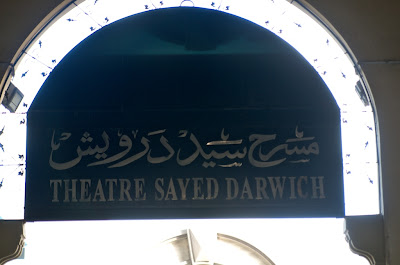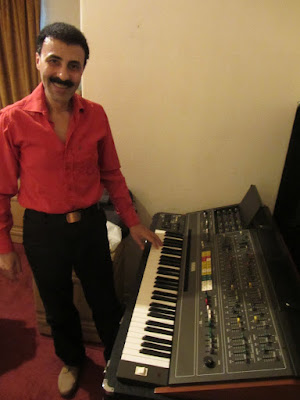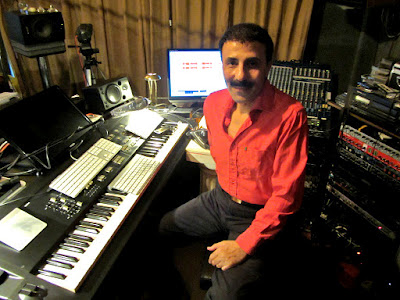Moody Emam is a composer, producer, arranger, and singer, and a fine observer of Egyptian music. Banning Eyre met him in his Cairo studio for a long, ranging conversation. Here’s a short excerpt on the subject of one of Egypt’s most important singer/composers, Sayed Darwish. Darwish lived from 1892-1923, but accomplished an amazing amount in his short life.
B.E.: … You mentioned Sayed Darwish, whose name comes up probably more than any other name as being this kind of wellspring figure in the whole growth of Egyptian musical creativity in the 20th century. For people who don't know, tell us who he was.
M.E.: Sayed Darwish comes from Alexandria, a city by the Sea, an ancient city, a beautiful city. People from Alexandria, they are music lovers. They are born that way. They have a very good musical ear. They are happy people, even when times are harsh. They get to see the horizon, they get to see the sea, they are fishermen, they are excellent swimmers. Beautiful girls. The most beautiful girls are there. It's also a very universal city, because it's ancient. It is there where you see Egyptian Greeks, Egyptian Romans, Egyptian Armenians, Egyptian Germans, Egyptian British. It is there. So it's culturally rich. This is where Sayed Darwish grew up. And he was a Sheikh.
At the time, in Egypt, the title Sheikh, doesn't mean a prince were as in the Gulf, like in Dubai or Saudi Arabia. Sheikh means a person who has recited all of the Koran, which makes that person a singer, naturally, and a very well-trained singer. And makes that person also fluent in Arabic dialects, including the classical Arabic. So he will know more than a thing or two about being a lyricist, writing, voicing. And these people, who are trained as Sheikhs, reciters, would be people who would enjoy a very wide voice range, from baritone to alti. They know several techniques with their voices. So Sayed Darwish was like that. Also he studied classical music in Italy, and he was fascinated with Italian composers, with European composers in general. And I think this made him kind of an innovator, only that the instruments that were available to him at the time, and Egyptian performers were limited. The system was limited.
The small five-person takht was still there—one ney, which is our flute, one oud, which is our lute, one tabla, one violin perhaps, or the kamanche, which is the Turkish violin, which you hold like a cello, only it's much smaller. And Egyptian tambourine, the riqq. It's a tambourine with a skin. They made very good use of all these instruments, but Darwish’s dream was to bring orchestral depth to Egyptian music. And he knew that the quarter tone which the Middle East is very famous for, he knew that this was kind of a hindrance. If you get rid of it, most of the time, you will be able to arrange the music, because it's almost impossible to harmonize with the quarter tone. Sayed Darwish was very savvy about this, and he made compositions that still sounded Mediterranean, Alexandria, Egypt, the Middle East, but less quarter tone here and there… And his music can easily be arranged, this is why it lives on. Every time one of us wants to experiment with one of Sayed Darwish's songs or pieces, it does comply. It works. It accepts.
And because he knew how to make complex melodies, and he was very, very savvy with lyrics--He had an excellent lyricist Bayram Al Tunsi; he was a genius in simplicity and in rhyme--Sayed Darwish understood what was smart about Mozart. Keep it simple, and they will love you for it. So he kept his melody simple, much, much easier to memorize, which made them sing along songs. The more sing-along you do, the longer you will endure as a composer. There were many other brilliant composers at the time of Sayed Darwish, but they didn't make simple melodies, not easy to sing along with. A quarter tone is very difficult. Not everyone can do that. So Sayed Darwish was very clever.
B.E.: And many of his songs were shorter than what had been common and before that, right?
M.E.: Yes. That is true. He made long ones, and he made musicals too. He was very good at making the operatti style, what you would call the rock opera today, but he was also good at making short verses that you can sing-along and repeat, that's easy for anyone. Kids can do it. Even someone who is afraid to sing, you know, someone who is shy can join in and sing-along.

B.E.: So that makes him a kind of father of the Egyptian pop music.
M.E.: Yes, indeed. Very much. Yes.
B.E.: He knew how to make a hit.
M.E.: He knew how to make a hit. And his lyricist also knew how to do that. Bayram Al Tunsi. And what was strong about Sayed Darwish also is that he was not afraid of change. He and Bayram, in the lyrics and in the music. They went outside of what was usual. They broke tradition. At that time, everything was love songs. Yearning and tears and holding and hugging, and lusting after someone. Her beauty. His whenever. But they addressed the society. They talked about the faults of individuals, and the needs of the collective. They were aware of this collective individuality, the needs of one, the needs of many. They were fantastic in this. And they criticized the society, which was a very strong point. No one did that. And they were very frank about it. They did not fear the displeasure which they faced.
They faced displeasure. They were accused of things. They were arrested. Sayed Darwish was arrested several times. Sometimes he was Bob Dylan, sometimes he was Paul McCartney, sometimes he was Jimi Hendrix. He had just liberated view about the use of common drugs, and he made songs about them, very funny songs.
B.E.: Like hashish.
M.E.: Like hashish. He made a song about hashish that we used to play live, my brother and I. It was called "El Tohfa Gaya." Tohfa Gaya is a word that they invented. Tohfa is a relic, a collectors item.. Tohfa Gaya is someone who is like that. People who are like that. So the song goes... he made it sound as if a choir of people who got high on hashish were singing, and they're defending themselves because they are being accused of being no good by the rest of society. And they defend themselves, and say, "No, no, no. Should the need arise, if our country calls, you will see very different people. We are just afraid of the police." [LAUGHS] They fear no one, only the police. And they explain in the song how the signal. Someone coughs, and the police approached, things like that. And they put the cough in the music, with the beat, and it sounds very funny. So he was funny. He was popular. He was a people's guy. He wasn't a snob.
And he was very much in love with this lady who was a dancer. Her name was Delilah. So if you ask him, she was his Delilah. He was madly in love with her. And he wrote fantastic love songs. They live on today. And he played with double meaning, words with double meaning, he and Bayram Al Tunsi. He was madly, desperately in love, but this lady, Delilah. But she toyed with him. It's very difficult, even today, to determine whether she really loved him, or whether she just wanted to keep him, like a trophy. Because she would see him. They were together. And not together.
B.E.: This is very interesting. I understood that he wrote songs that everybody liked to sing together. Hearing what you're saying now really makes me understand
M.E.: He made sing-alongs. And he also made very special solos that only a good singer can do.
B.E.: He did it all.
M.E.: Yes.
B.E.: How long did he live? And when did he die?
M.E.: He died in his 30s, in 1923. They say he overdosed. Which also puts him in the company of the rock heroes I'm telling you about. He was a very sensitive man. He was living in difficult times. He was a patriotic man, very patriotic. As much as he was in love with his Delilah, he was in love with Egypt.
 B.E.: This was during the British occupation.
B.E.: This was during the British occupation.
M.E.: Well, the British occupation lasted until the late 40s and early 50s.
B.E.: And it started in 1882, ten years before Darwish was born.
M.E.: Egypt was separated from the Ottoman Empire the time of Mohammed Ali, who was a Mamluk, from Albania. King Mohammed Ali became an Egyptian and he was a military man. He was a military general who was trusted a lot by locals. He became one of them. And they needed him because he was a strong man. He was a strong planner and strategist. And Egypt needed to be military. She always did, really. And King Mohammed Ali he made a Renaissance. And when he separated Egypt from the Ottoman Empire...
Because the Ottoman Empire was into supremacy. Egypt wasn't equal. An Egyptian wasn't equal to a Turkish man at the time. It was a very imperial thing. When he separated Egypt, he gave Egypt back her identity, her independence as an ancient, great country, as a mother civilization. And he worked on reviving Egypt by excavations, finding ancient monuments, and he created a fleet, a commercial fleet. And he created a military fleet of ships also, built by Egyptian hands, which helped the Egyptian worker a lot. This is exactly what his Renaissance was like. He created business income, commerce, the arts were improving. He was big. He was King Mohammed Ali because he wanted Egypt to become rich and strong, very strong.
His fleet was destroyed by the British and the French over a rivalry for dominion over the Mediterranean. But Egypt lived on. Mohamed Ali's Egypt continued as a rich country, with lots of good relations and treaties and stuff. And descendents of King Mohammed Ali went up until King Farouk, who left Egypt in the 50s. So the British occupation... it wasn't really a colonial occupation. This is important to mention. But it was a kind of control. It was a protection, custody thing. Because of the Suez Canal, and the world wars, I and II. It was controversial. There were Egyptians who were very pleased with Europe and the British. Like today. There are people who still believe in one world, the unity of mankind, cultural bridges. Why not? It's also a very beautiful dream, if it means everyone will be good. Everyone will be happy.

Others saw things differently. Misunderstandings do happen. In my opinion, I think Sayed Darwish was also broad-minded. He would object to something he didn't like, and he would accept something that was agreeable. And he put that in his music. He would sometimes address a guy called Johnny. He would make a joke. You know, he was like making a journal. This is what was good about it. He was honest. He was not biased. He would tell you, "I like this about you. I don't like this about you. I like this about myself. I don't like this about myself." That honesty was really, really one of the big things about Sayed Darwish. Other big talents may not have endured like he did because they were maybe more into personal gain, commercialism and he was. He was not a rich man.
B.E.: And he died young, after being harassed a lot by the state. And this is during the British occupation, such as it was. It's very interesting that someone who has this kind of spotty background, drugs and whatever, Jimi Hendrix that background, is so universally revered. Even now, at a time when the society is much, much more conservative, or has become more conservative. What do you make of Sayed Darwish's status now in Egypt?
M.E.: There are of course young people who know Sayed Darwish, but they would be a few privileged ones who studied music, or studied arts. The media doesn't pay enough attention to his legacy, which is very sad. Because we can benefit a great deal. The world can benefit from someone like Sayed Darwish, his time and his wisdom, his views, and how open-minded and liberated he was. It isn't just in the tunes. And how romantic he was. He was really a man for all times. It's also sad because people in Egypt need, they need to take this kind of vitamin for their souls and their minds. People are becoming, like you say, more conservative now, in the wrong way, about the wrong things. It's not a good time to be closed minded or narrowminded. And the fact that he had of spotty something here or there. In my judgment, this continues. I would meet someone, and he would say, "But why are all musicians so-and-so...." There is no such animal as "all musicians." And what bothers me is that if you use Sayed Darwish as a template—Yes. Very good. He should be used as a template—his achievements and his goals, his dreams, and his statements were much, much greater than his faults, if any. And that's what you should pay attention to.
B.E.: Absolutely. I understand that his songs were sung in Tahrir square. He's one of the people whose songs were sung.
M.E.: Yeah, sure. Sure. He made the best sing-alongs. And he made songs for Egypt. So it's natural that the guys over in Tahrir during the demonstrations in protest, it's natural. He made the best stuff.









